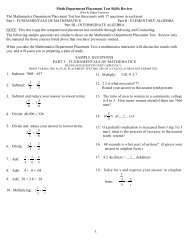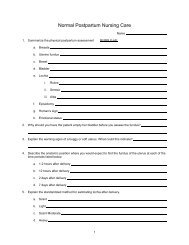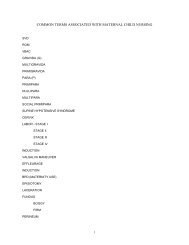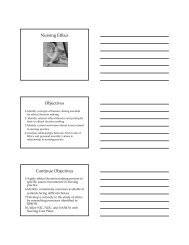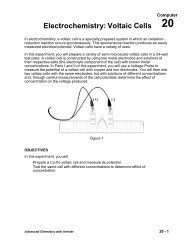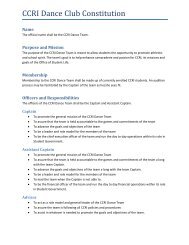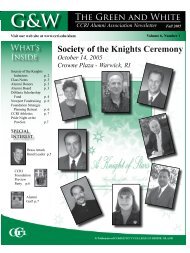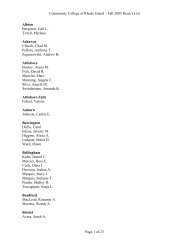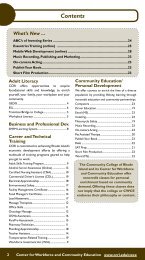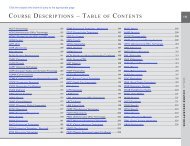Course Descriptions - Community College of Rhode Island
Course Descriptions - Community College of Rhode Island
Course Descriptions - Community College of Rhode Island
Create successful ePaper yourself
Turn your PDF publications into a flip-book with our unique Google optimized e-Paper software.
competency exam is included. Note: Grade<br />
<strong>of</strong> “C” or better is required for Human Services<br />
program students. Lecture: 3 hours<br />
Level I Field and Practicum<br />
Experiences - 3 Credits<br />
All field and practicum courses<br />
are competency-based internships<br />
designed to train students in basic<br />
human service skills through a combination<br />
<strong>of</strong> field placement and seminar<br />
activities. Field placements range<br />
from 50 to 90 hours per semester and<br />
require a one- to two- hour campusbased<br />
seminar. (Prerequisite: Grades <strong>of</strong> “C”<br />
or better in HMNS 1010 and the required<br />
Human Services courses for each concentration)<br />
Note: Eligibility for field placement at<br />
all levels is subject to academic standing and<br />
instructor recommendations regarding readiness.<br />
HMNS 1200 - Human Services Practicum<br />
I - 3 Credits<br />
The purpose <strong>of</strong> this course is to develop and<br />
refine observation, communication, presentation,<br />
writing and service skills appropriate<br />
for entry-level placement in a social<br />
service environment. It is designed to assist<br />
students in clarifying their concentration<br />
by providing a skill-specific seminar and a<br />
50-hour Service Learning practicum. Locations<br />
are sought for students to develop<br />
entry-level helping skills while engaged in<br />
activities that support community service,<br />
civic commitment and the development <strong>of</strong><br />
social consciousness. (Prerequisites: HMNS<br />
1010, 2200) Grades <strong>of</strong> “C” or better required.<br />
Note: Placement is subject to instructor assessment<br />
<strong>of</strong> student readiness.<br />
HMNS 1201 - Practicum for<br />
Developmental Disabilities - 3 Credits<br />
Practicum for Developmental Disabilities<br />
introduces students to the day-to-day<br />
activities involved in the care and support<br />
<strong>of</strong> people with developmental disabilities<br />
in home and work settings. Students learn<br />
the basics <strong>of</strong> working as a direct support<br />
pr<strong>of</strong>essional through classroom lectures<br />
and discussions <strong>of</strong> the core requirements<br />
<strong>of</strong> the job <strong>of</strong> the DSP. In field placement,<br />
students observe, assist and finally lead<br />
in the direct support <strong>of</strong> individual clients<br />
with the supervision <strong>of</strong> agency and college<br />
faculty mentors. (Prerequisite: HMNS 1010)<br />
Lecture: 3 hours<br />
HMNS 1210 - Field Experience and<br />
Seminar I - Child Development -<br />
3 Credits<br />
This course provides a school or community-based<br />
internship and seminar to assist<br />
students in gaining entry-level skills for<br />
working with young children. Students will<br />
learn practical and pr<strong>of</strong>essional skills for<br />
establishing rapport with young children<br />
and how to select age-appropriate materials<br />
that promote the cognitive, social-emotional<br />
and physical development <strong>of</strong> young<br />
children. Students begin the development<br />
<strong>of</strong> their pr<strong>of</strong>essional portfolio in their Field<br />
I Seminar. (Prerequisites: HMNS 1010, 2100<br />
with grades <strong>of</strong> “C” or better required)<br />
HMNS 1220 - Field Experience and<br />
Seminar I -Education/Special Needs -<br />
3 Credits<br />
This course places students in a school or<br />
community-based internship that provides<br />
hands-on training with typical and/or special<br />
needs students. Students gain entry-level<br />
skills in instructional work, developing rapport,<br />
behavior management, student assessment<br />
and materials presentation and utilize<br />
their seminar to address issues relating to<br />
their field placement. (Prerequisite: HMNS<br />
1010 and either 2060 or 2070 with grades <strong>of</strong><br />
“C” or better required)<br />
HMNS 1300 - RI Learning Standards:<br />
Using the Standards to Support<br />
Children’s Learning - 1 Credit<br />
This course helps beginning early childhood<br />
pr<strong>of</strong>essionals develop the skills, knowledge<br />
and competencies needed to engage in<br />
quality early childhood practice resulting in<br />
improved learning outcomes for children.<br />
Lecture: 1 hour<br />
HMNS 1310 - Heads Up Reading -<br />
3 Credits<br />
This course is <strong>of</strong>fered by Ready to Learn/<br />
Providence. Focus is on research-based<br />
principles and practices for providing children,<br />
birth through age 5, a strong foundation<br />
in early reading and writing within<br />
a developmentally appropriate approach.<br />
Lecture: 3 hours<br />
HMNS 1320 - Mind in the Making -<br />
3 Credits<br />
This course is <strong>of</strong>fered by Ready to Learn/<br />
Providence. It complements existing early<br />
childhood teaching curricula, focusing on<br />
what research supports early learning and<br />
the application in everyday practice. (Corequisite:<br />
HMNS 2100) Lecture: 3 hours<br />
HMNS 1330 - Literacy in Early Childhood -<br />
3 Credits<br />
Literacy in Early Childhood focuses on the<br />
role <strong>of</strong> literacy in the planning and implementation<br />
<strong>of</strong> curriculum for preschool<br />
children. Literacy and language development<br />
are examined in depth and provide<br />
a lens through which other subject areas<br />
are investigated. Curriculum planning<br />
and implementation stress developmental<br />
appropriateness, documentation and evaluation<br />
<strong>of</strong> how children learn, and involvement<br />
<strong>of</strong> the family. Lecture: 3 hours<br />
HMNS 2010 - American Sign Language III -<br />
3 Credits<br />
This is an intermediate level sign language<br />
course that emphasizes further development<br />
<strong>of</strong> expressive and receptive skills<br />
appropriate for a broad range <strong>of</strong> conversational<br />
situations. Grammatical functions are<br />
stressed along with a more in-depth study<br />
<strong>of</strong> deaf history, deaf culture, linguistics and<br />
the use <strong>of</strong> classifiers. Note: Grade <strong>of</strong> “C” or<br />
Prerequisite: Successful completion <strong>of</strong> course required before registering. Corequisite: <strong>Course</strong> must be taken prior to or at the same time.<br />
hmns<br />
better is required for Human Services program<br />
students. (Prerequisite: HMNS 1060, 1070)<br />
Lecture: 3 hours<br />
HMNS 2020 - American Sign Language<br />
IV - 3 Credits<br />
This course provides the second level<br />
<strong>of</strong> intermediate study in American Sign<br />
Language. Expressive and receptive skills<br />
are expanded and refined to advance students<br />
toward interpreter training in fields<br />
beyond human service settings. Pr<strong>of</strong>iciency<br />
in areas calling for in-depth dialogue with<br />
individuals and group members from the<br />
deaf community is stressed. Note: Grade <strong>of</strong><br />
“C” or better is required for Human Services<br />
program students. (Prerequisite: HMNS 1060,<br />
1070, 2010) Lecture: 3 hours<br />
HMNS 2030 - Emergent Literacy:<br />
Reading Readiness in Early Childhood<br />
Education - 3 Credits<br />
This course introduces students to the<br />
theoretical and practical foundations <strong>of</strong><br />
emergent literacy. Students will develop<br />
teacher competencies in areas <strong>of</strong> developmental<br />
assessment, teaching methodology,<br />
curriculum planning and implementation.<br />
This course is required for R.I. certification<br />
in Early Childhood Education. Note: Grade<br />
<strong>of</strong> “C” or better is required for Human Services<br />
program students. (Prerequisite: HMNS 2100,<br />
2120, 1210, 2310) Lecture: 3 hours<br />
HMNS 2060 - Foundations <strong>of</strong> Teaching<br />
and Learning - 3 Credits<br />
This course provides a theoretical and<br />
practical foundation for understanding the<br />
evolution and current state <strong>of</strong> American<br />
schooling. Students will examine critical<br />
issues related to classroom environment,<br />
learning styles and appropriate instruction,<br />
curriculum development, standards<br />
and diversity. Students will gain a practical<br />
understanding <strong>of</strong> those ethics and indices<br />
<strong>of</strong> pr<strong>of</strong>essional development that correlate<br />
with effective teaching. This is a required<br />
course for teacher associates, education<br />
177



